|
|
|
Sort Order |
|
|
|
Items / Page
|
|
|
|
|
|
|
| Srl | Item |
| 1 |
ID:
193483
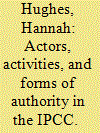

|
|
|
|
|
| Summary/Abstract |
Scholarship on global environmental assessments call for these organisations to become more reflexive to address challenges around participation, inclusivity of perspectives, and responsivity to the policy domains they inform. However, there has been less call for reflexivity in IPCC scholarship or closer examination of how routine concepts condition scholarly understanding by focusing on science and politics over other social dynamics. In this article, I suggest that scholarly reflexivity could advance new analytical approaches that provide practical insights for changing organisational structures. Through reflecting on my understanding of the IPCC, I develop actors, activities, and forms of authority as a new analytical framework for studying international organisations and knowledge bodies. Through its application, I describe the social order of the IPCC within and between the panel, the bureau, the technical support units, the secretariat and the authors, which is revealing of which actors, on the basis of what authority, have symbolic power over the writing of climate change. The fine-grained analysis of organisations enabled by this analytical framework reveals how dominance can and is being remade through intergovernmental relations and potentially, identifies avenues that managers of these bodies can pursue to challenge it.
|
|
|
|
|
|
|
|
|
|
|
|
|
|
|
|
| 2 |
ID:
061207
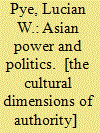

|
|
|
|
|
| Publication |
Cambridge, Belknap Press of Harvard University Press, 1985.
|
| Description |
xiii, 414p.
|
| Standard Number |
0674049799
|
|
|
|
|
|
|
|
|
|
|
|
Copies: C:1/I:0,R:0,Q:0
Circulation
| Accession# | Call# | Current Location | Status | Policy | Location |
| 049509 | 306.2095/PYE 049509 | Main | On Shelf | General | |
|
|
|
|
| 3 |
ID:
172652
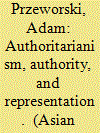

|
|
|
|
|
| Summary/Abstract |
Representation is always a dynamic relation, a tatonnement, in which the represented adjust their preferences on the basis of beliefs induced by the representatives. All rulers—those selected in clean elections, those who hold such ceremonies without putting their power at stake, and those who do not even bother to hold them—claim to have reasons to be followed, and people are willing to follow them if they believe these are good reasons. Thus, individual preferences, “wills,”are influenced by the relation of representation. The controversial issue is whether the relation of representation can be assessed when preferences are endogenous, in particular when people are not exposed to a plurality of reasons.
|
|
|
|
|
|
|
|
|
|
|
|
|
|
|
|
| 4 |
ID:
101841


|
|
|
|
|
| Publication |
2011.
|
| Summary/Abstract |
This essay argues that many modern discussions of Locke's political theory are unconsciously shaped by an imaginative picture of the world inherited from the past, on which authority and freedom are fundamentally antipathetic. The consequences of this picture may be seen in the distinction made customarily in Locke studies between the 'authoritarian' Locke of Two Tracts on Government, for whom authority descends from God, and the later, 'liberal,' Locke, for whom authority arises from the will and agreement of individuals, and felt in the emphases placed on consent and resistance in most interpretations of Lockean political thought. The essay examines the composition and contours of this picture and, by holding up a mirror to contemporary Locke scholarship, draws attention to some of the ways in which it unwittingly distorts Locke's thinking.
|
|
|
|
|
|
|
|
|
|
|
|
|
|
|
|
| 5 |
ID:
190725
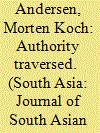

|
|
|
|
|
| Summary/Abstract |
This article is about territorial claims, authority and rights in an urban settlement or ‘bosti’ in central Dhaka. It highlights the drama of a violent encounter between a police officer and a young man, unfolding how the social ordering of urban space is (re)produced in and through authority and violence. It illustrates how situated practices of authority define who can access institutions of rights and justice, and who cannot. It concludes that claims for rights and remedies are not easy to act out when the collusion of state and non-state authority negate voice and agency and leave negotiation and equitable justice reserved for those recognised within a structure of resolution, illuminating how intimacies of violence interlink with wider political configurations and economic conditions.
|
|
|
|
|
|
|
|
|
|
|
|
|
|
|
|
| 6 |
ID:
175172
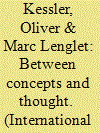

|
|
|
|
|
| Summary/Abstract |
This article advances the argument that the acceleration of practices introduced by digital technologies also impact key concepts of social theory. Digital technologies not only give rise to new concepts, but they also reconfigure our entire socio-political conceptual vocabulary. In particular, this acceleration reorganises the relationship between the spatial and temporal dimensions of political concepts. As a consequence, our spatially defined understanding of authority, hierarchy or relation underestimates the repercussions of shifting temporalities. This article pursues this shift from space to time and outlines how temporal relationality is gradually impacting the representations and images we live by.
|
|
|
|
|
|
|
|
|
|
|
|
|
|
|
|
| 7 |
ID:
187030
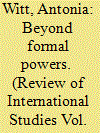

|
|
|
|
|
| Summary/Abstract |
International organisations (IOs) are said to command growing levels of authority. But in studying this phenomenon, scholars predominantly focus on the formal capacities member states assign to IOs. Much less attention is paid to the effects of IO authority, that is, how authority is exerted in practice and what it does within the affected societies. Based on a case study of the African Union's (AU) anti-coup regime, I make the case for a ‘bottom-up’ approach to IO authority, focusing on its localised enactment and effects. Analysing the AU's authority through a governmentality lens and drawing on several months of field research, I show that the AU's authority to govern coups is indeed effective: in commanding the re-establishment of constitutional order, the AU prescribes a particular imaginary of political order to resolve conflict and shapes the conduct of political actors in affected states by inscribing them into this order. But rather than operating in a top-down, direct way, the AU's authority is enacted in a distant, diffuse manner. Although based on formal powers assigned to the AU, neither the way this authority is exercised nor its effects can be inferred merely from these formal powers.
|
|
|
|
|
|
|
|
|
|
|
|
|
|
|
|
| 8 |
ID:
071780
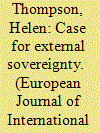

|
|
|
|
|
| Publication |
2006.
|
| Summary/Abstract |
Critics of sovereignty have argued that it produces outcomes that violate universal moral principles. This article offers a qualified defence of external sovereignty by returning to some of the arguments first deployed to support claims to it. The article argues that if claims to external sovereignty are understood in part as a critique of the ambitions of powerful states, then the presumption of it in international politics, not as an absolute value but a crucial consequential consideration, could act as a restraint on the power of the world's strongest states by making justifications for war somewhat more difficult.
|
|
|
|
|
|
|
|
|
|
|
|
|
|
|
|
| 9 |
ID:
159874
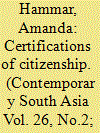

|
|
|
|
|
| Summary/Abstract |
A focus on certifications of citizenship as a range of inter-related practices of identity classification, categorisation, registration and validation, provides productive opportunities to explore the many ways that different authorities and/or different citizens engage with both the meaning and materiality of identity documents. At the heart of such practices is a complex politics of recognition that in turn is linked to the political economies of certification and of certificates themselves. A selection of African cases helps to highlight some of the paradoxes of certification – such as its simultaneous openings and closures – while pointing to the relationality of its multiple dimensions, including: the material, symbolic, social, spatial, temporal, demographic, political and institutional. These overlapping dimensions manifest in site-specific ways across different empirical contexts in Africa and Asia and beyond, making transnational conversations especially meaningful for deeper understandings of the complexities of the authority-certification-citizenship nexus.
|
|
|
|
|
|
|
|
|
|
|
|
|
|
|
|
| 10 |
ID:
179323
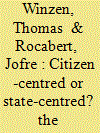

|
|
|
|
|
| Summary/Abstract |
As a result of the spread of International Parliamentary Institutions (IPIs), international organisations face crucial questions of representational design. We introduce a distinction between citizen-centred and state-centred IPIs in international organisations (IO). Drawing on original data, we show that, even though parliaments might seem likely to foster citizen representation in the international realm, they in fact often follow state-centred representational designs. We further find that citizen-centred IPIs are a near exclusive phenomenon of a few, democratic regional integration projects. Given the prevalence of state-centred representational designs, we conclude that IPIs’ potential to represent different cross-border communities, concerns, and conflict lines than intergovernmental IO bodies remains institutionally limited. IPIs are thus unlikely to challenge these bodies in similar ways as often observed in the relationship between the European Parliament and the European Union's Council of Ministers.
|
|
|
|
|
|
|
|
|
|
|
|
|
|
|
|
| 11 |
ID:
153613
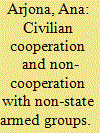

|
|
|
|
|
| Summary/Abstract |
Terms like ‘support’ and ‘collaboration’ are often used interchangeably to denote a loose set of acts or attitudes that benefit non-state armed groups (NSAGs). However, these terms are seldom defined, and the alternatives available to civilians are rarely identified. Moreover, existing approaches overlook that the interaction between civilians and NSAGs is often one between ruler and ruled, which makes obedience and resistance central. This paper proposes to conceptualize the choices available to civilians as forms of cooperation and non-cooperation, offers a typology, and discusses the implications for theory building on civilian and NSAG behavior, and on the functioning of armed social orders.
|
|
|
|
|
|
|
|
|
|
|
|
|
|
|
|
| 12 |
ID:
156237
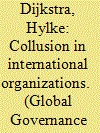

|
|
|
|
|
| Summary/Abstract |
In the theoretical literature on the authority of international secretariats, academics often dichotomize between states and secretariats. Even when they account for the fact that states are often divided, they normally adopt a two-step approach: states first resolve their own differences before they entertain relations with secretariats. This article provides an alternative perspective. It argues that individual or groups of states may collude with like-minded secretariats to achieve outcomes at the expense of other states. Working informally together is beneficial. States can benefit from the rational-legal, delegated, moral, and expert authority of secretariats. States and secretariats can also exchange resources. The article illustrates this perspective through two case studies: the NATO intervention in Libya in 2011 and the European Union's military operation in Chad in 2008.
|
|
|
|
|
|
|
|
|
|
|
|
|
|
|
|
| 13 |
|
| 14 |
ID:
186596
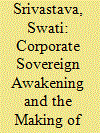

|
|
|
|
|
| Summary/Abstract |
The English East India Company's “company-state” lasted 274 years—longer than most states. This research note uses new archival evidence to study the Company as a catalyst in the development of modern state sovereignty. Drawing on the records of 16,740 managerial and shareholder meetings between 1678 and 1795, I find that as the Company grew through wars, its claim to sovereign authority shifted from a privilege delegated by Crown and Parliament to a self-possessed right. This “sovereign awakening” sparked a reckoning within the English state, which had thus far tolerated ambiguity in Company sovereignty based on the early modern shared international understanding of divisible, nonhierarchical layered sovereignty. But self-possessed nonstate sovereignty claimed from the core of the state became too much. State actors responded by anchoring sovereign authority along more hierarchical, indivisible foundations espoused by theorists centuries earlier. The new research makes two contributions. First, it introduces the conceptual dynamic of “war awakens sovereigns” (beyond making states) by entangling entities in peacemaking to defend sovereign claims. Second, it extends arguments about the European switch from layered sovereignty to hierarchical statist forms by situating the Company's sovereign evolution in this transformation. Ultimately, this study enables fuller historicization of both nonstate authority and the social construction of sovereignty in international politics.
|
|
|
|
|
|
|
|
|
|
|
|
|
|
|
|
| 15 |
ID:
086816
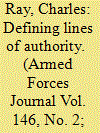

|
|
|
|
|
| Publication |
2009.
|
| Summary/Abstract |
Since the administration of President Dwight Eisenhower, newly appointed American ambassadors have been given a presidential letter outlining their authority over U.S. government programs and personnel in the country to which they are accredited. The letter describes the ambassador or chief of mission (COM)as the personal representative of the president, with full authority for the direction, coordination and supervision of all U.S. government executive-branch employees, except those under a combatant commander (COCOM).
|
|
|
|
|
|
|
|
|
|
|
|
|
|
|
|
| 16 |
ID:
023783
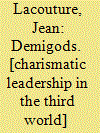

|
|
|
|
|
| Publication |
London, Secker and Warburg, 1971.
|
| Description |
viii, 300p.Hbk
|
| Contents |
Includes bibliography, index.
|
| Standard Number |
436240513
|
|
|
|
|
|
|
|
|
|
|
|
Copies: C:1/I:0,R:0,Q:0
Circulation
| Accession# | Call# | Current Location | Status | Policy | Location |
| 007752 | 923.1/LAC 007752 | Main | On Shelf | General | |
|
|
|
|
| 17 |
ID:
159972
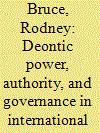

|
|
|
|
|
| Summary/Abstract |
Barnett and Duvall have offered a highly useful constructivist taxonomy of power in response to the rationalist question of why constructivists formerly lacked a theory of power. However, in applying their taxonomy of power to the question of global governance, they draw upon a specific interpretation of their ‘structural’ form of power from the radical theory of Steven Lukes. This move generates a number of ontological and analytic issues that constructivists normally avoid. This article offers three amendments to Barnett and Duvall’s thesis. These involve the (1) recognition and use of the subsumption of the constitutive forms of power that they theorize within the concept of ‘deontic power’, introduced in the institutional philosophy of John Searle and (2) recognition that the posited distinction between subjective and objective interests returns us to a rationalist and materialist ontology that resolves the question of actor interests and motivations through exogenous imputation by the analyst – a retrograde step for constructivist theory that can and should be avoided. (3) In developing the deontic bases of the constitutive forms of power introduced by Barnett and Duvall, we will recover the social means by which power can be exercised as authority.
|
|
|
|
|
|
|
|
|
|
|
|
|
|
|
|
| 18 |
ID:
096600
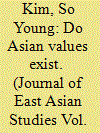

|
|
|
|
|
| Publication |
2010.
|
| Summary/Abstract |
The Asian values debate has been long on speculative advocacy but short on empirical validation, with statistical tests emerging only lately. This study explores two questions: whether Asians indeed hold distinct cultural attitudes when compared with non-Asians and whether these cultural attitudes and beliefs identified as Asian values form coherent dimensions among Asians. The study first identifies four dimensions of Asian values based on a review of various Asian values discourses: familism, communalism, authority orientations, and work ethic. The findings from the empirical analysis based on multilevel models and factor analysis return mixed support for the Asian values hypothesis. Although East Asian respondents do exhibit strong work-related values compared with those from other regions, commitment to familial values and authoritarian orientations are actually lower among East Asians. Also, while preference for strong leadership and parental duty do turn out to form distinct sets of attitudes among South and Southeast Asians, the four dimensions do not constitute a clear value complex in the minds of East Asians.
|
|
|
|
|
|
|
|
|
|
|
|
|
|
|
|
| 19 |
ID:
156804
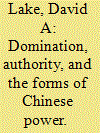

|
|
|
|
|
| Summary/Abstract |
The debate about China’s rise and future United States–China relations has focused on the purpose to which China’s growing international power will be put. This article focuses on the form of China’s power, distinguishing between domination and authority. Different great powers have, at different times, chosen one, the other, or more commonly differing mixes of the two forms. How China chooses now and in the future will have a significant effect on its relationships with other states, and through them on its relationship with the United States. The first section explores the differences between domination and authority as strategies for the exercise of international power. The second section summarizes a theory of authority with particular relevance to China today. Though necessarily speculative, this section identifies where China is most likely to choose one strategy over the other as its international influence expands. The final section examines the domestic impediments in China to the choice of authority. While both China and the United States might be better off in a world in which the former constructs an international hierarchy to parallel the latter’s, the conclusion draws a relatively pessimistic assessment of the prospects for cooperation between the two emerging superpowers.
|
|
|
|
|
|
|
|
|
|
|
|
|
|
|
|
| 20 |
ID:
119578
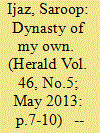

|
|
|
|
|
|
|
|